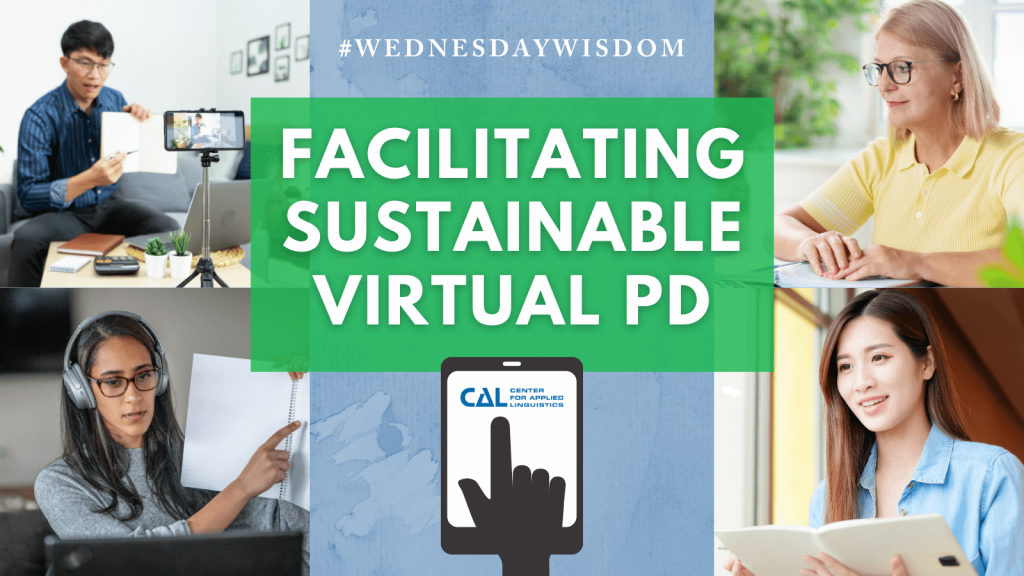
This article originally appeared in the September 15, 2020 edition of Language Magazine.
By Annie Duguay, Director of Language and Literacy
Whether teachers are instructing entirely online, face-to-face, or in a hybrid capacity, the one constant this school year will be instructional technology.
Even in a classroom setting, health guidelines will dictate that students not sit side-by-side sharing math manipulatives, creating posters, or handling science lab equipment. Instead, students will be collaborating through online platforms and may even be interacting asynchronously through tools such as Google Jamboard or Flipgrid.
Here’s the good news: you can do it!
After a summer of facilitating online professional development for educators across the U.S., Canada, and in international schools, I have learned that figuring out online teaching tools is akin to the language learning experience itself. With enough practice, you gain confidence, proficiency, and get to interact with people you otherwise might not meet at home.
Fortunately for educators of linguistically and culturally diverse students, students can practice and apply all four language domains—reading, writing, listening, and speaking–using online technology.
On the other hand, many aspects of online learning and instruction also have heightened linguistic demands, for both students and educators.
What we have here is an idea for effective professional development that models how to meet these challenges in the classroom and leverage the online tools to create effective and engaging PD that will be sustained beyond the current global pandemic we are facing.
Just as for online student instruction, the core principles of effective PD remain the same in the virtual environment.
We have modified these standards for your online and hybrid model learning environments:
Standard 1: Professional Development is Research-Based Content Driven and Relevant
- Online PD facilitators should:
- include research on virtual instruction and learning for multilingual learners
- highlight research on multilingual learners’ access to technology and online learning skills
- share research-based online tools and resources that teachers can directly apply with students
- draw on research on interrupted schooling, social-emotional health, and resilience
- model a variety of online tools to enable students to practice and apply reading, writing, listening, and speaking skills
Standard 2: Professional Development is Meaningful and Intellectually Stimulating
- Online PD facilitators should:
- Provide opportunities for collaboration and engaging activities
- Model digital learning tools, particularly those that teachers will use directly with students
- align to district technology plans and subscriptions
- Provide opportunities to create materials, lesson plans, and modify virtual tools during PD sessions
- include bridges for educators to connect virtual instruction to any potential face-to-face instruction and vice versa
- include step-by-step instruction
- select and implement in-depth online tools, using all the functionality possible
- allow time for practice and application with tech, so that teachers are confident with the tools
Standard 3: Professional Development is Engaging, Interactive, and Collaborative
- Online PD facilitators should:
- provide opportunities for online collaboration and discussion with colleagues
- create activities that are interactive and appealing through an online format
- allow for moderated and non-moderated discussions with colleagues
- promote virtual follow-ups after synchronous workshops
- foster communication through discussion boards, blog posts, shared lesson plans, and write-up of practices and materials
Standard 4: Professional Development is Well Organized and Facilitated
- Online PD facilitators should:
- develop and assign roles and checklists of tasks
- prepare links in advance
- familiarize themselves with the online platform’s functionality
- have test runs and back-up plans!
- list and provide all required materials needed for online workshops give and what needs to be printed
- Include a handout with links/area for teachers to add in login/password info for any new platforms used in PD
Standard 5: Professional Development is Positively Framed, Respectful, and Inclusive
- Online PD facilitators should:
- use online images that reflect diversity
- provide additional wait time to allow more voices on both the chat box and sharing out
- express grace for the uniquely stressful times of a global pandemic
- have patience with their own wifi, technology and the tech access of individual’s homes
- Be patient with the tech skills of participants–also model how to be patient with students
- create norms around netiquette for respectful online conversation
- model and provide modifications for various levels of virtual access (i.e., recordings of sessions, off-line/low-tech alternatives, only using phone etc.)
- have an IT rep or designated co-facilitator to help with tech questions or issues that arise
Standard 6: Professional Development is Supportive of Future Learning and Growth
- Online PD facilitators should:
- offer online coaching, guided practice, lesson study and other job-embedded PD
- model working in a blended and online only environment
- provide resources for best practices with online learning
- reference modifications for face-to-face, asynchronous or synchronous instruction as circumstances change during the next year
- provide ongoing opportunities to explore and showcase different platforms, apps, and technology with colleagues
These standards were adapted from the Center for Applied Linguistics’ previously published Six Standards of Effective, Engaging, and Sustained Professional Development for Educators of Linguistically and Culturally Diverse Students.

